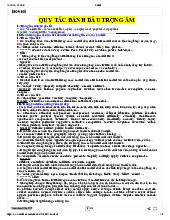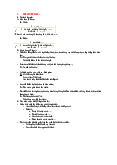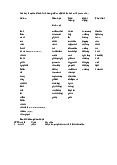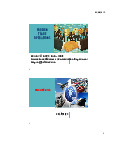





Preview text:
Write 20 examples for each kinds of word: 1. CLIPPING
Clipping is a word formation process in which longer words are shortened by removing one or more syllables. 1. Ad (from advertisement) 2. App (from application) 3. Bike (from bicycle) 4. Blog (from weblog) 5. Bus (from omnibus) 6. Cam (from camera) 7. Fan (from fanatic) 8. Gym (from gymnasium) 9. Info (from information) 10. Lab (from laboratory) 11. Phone (from telephone) 12. Pic (from picture) 13. Prof (from professor) 14. Quiz (from quizzical) 15. Rep (from representative) 16. Taxi (from taxicab) 17. Vet (from veterinarian) 18. Vet (from veteran) 19. Demo (from demonstration) 20. Doc (from doctor) 2. BLENDING
Blending is a word formation process in which parts of two or more words are combined to create a new word.
Blending is a word formation process in which parts of two or more words are combined to create a
new word. Here are 20 examples of blending words: 1. Brunch (breakfast + lunch)
2. Infomercial (information + commercial) 3. Smog (smoke + fog) 4. Motel (motor + hotel) 5. Email (electronic + mail)
6. Blogosphere (weblog + atmosphere)
7. Spanglish (Spanish + English)
8. Glamping (glamorous + camping)
9. Brangelina (Brad + Angelina, a celebrity couple) 10. Webinar (web + seminar)
11. Mockumentary (mock + documentary)
12. Ginormous (gigantic + enormous) 13. Spork (spoon + fork) 14. Mocktail (mock + cocktail)
15. Guesstimate (guess + estimate) 16. Hangry (hungry + angry) 17. Smog (smoke + fog) 18. Frenemy (friend + enemy)
19. Spanglish (Spanish + English)
20. Staycation (stay + vacation) 21. CONVERSION
Conversational words are typically used in everyday spoken language and informal writing. 1. Hi 2. Hello 3. Hey 4. How's it going? 5. What's up? 6. Howdy 7. Yep 8. Nope 9. Yeah 10. Nah 11. OK 12. Sure 13. Alright 14. I see 15. Gotcha 16. Cool 17. Thanks 18. Sorry 19. No problem 20. You're welcome 22. BACK FORMATION
Back-formation is a word-formation process in linguistics where a new word is created by removing
an affix (usually a suffix) from an existing word. This often results in a word that appears to be a
simpler or more basic form than the original. Here are 20 examples of back-formed words: 1. Edit (from "editor")
2. Resurrect (from "resurrection") 3. Donation (from "donator") 4. Accuse (from "accusation") 5. Burglar (from "burglary") 6. Enthuse (from "enthusiasm") 7. Donation (from "donator") 8. Orient (from "orientation") 9. Diagnose (from "diagnosis") 10. Analyze (from "analysis") 11. Donate (from "donation")
12. Enthusiast (from "enthusiasm") 13. Emote (from "emotion")
14. Babysit (from "babysitter") 15. Doze (from "drowsiness")
16. Compute (from "computation") 17. Slim (from "slender")
18. Childproof (from "childproofing")
19. Automate (from "automation") 20. Brunch (from "lunch") 21. ACRONYM
Acronyms are words formed from the initial letters of a longer name or phrase. 22. COMPOUND WORD
Compound words are formed by combining two or more individual words to create a new word with a specific meaning. 1. bluebird 23. greenhouѕe 24. ѕoft are 25. redhead 26. full moon 27. black board 28. quickѕil er 29. blackbird 30. aiting-room 31. ѕ imming-pool 32. aѕhing machine 33. dri ing licenѕe 34. dining room 35. li ing room 36. hite aѕh 37. COMPLEX WORD
Complex words are those that consist of a base word or root word and one or more affixes (prefixes or suffixes) added to it. 1. unbelivable 2. disconnected 3. dissapointed 4. unfriendship 5. international 6. Unhappiness 7. Dislike 8. Carelessness 9. Reconsider 10. Unforgettable 11. Reread 12. Disagreement 13. Misinterpretation 14. Illegible 15. Unharmful 16. Prehistoric 17. Underestimate 18. Rediscover 19. Overreact 20. Multinational 38. DERIVATION
Derivation refers to the process of forming new words by adding affixes (prefixes or suffixes) to a base word. 1. Happily (from "happy") 2. Teacher (from "teach") 3. Runner (from "run") 4. Unhappiness (from "happy")
5. Development (from "develop") 6. Careful (from "care") 7. Runner-up (from "run")
8. Unpleasant (from "pleasant")
9. Misunderstand (from "understand") 10. Friendship (from "friend") 11. Playful (from "play")
12. Carelessness (from "careless") 13. Hopeful (from "hope") 14. Incorrect (from "correct") 15. Ruler (from "rule") 16. Government (from "govern")
17. Successful (from "success") 18. Disobey (from "obey") 19. Quickly (from "quick") 20. Movement (from "move") 39. BOROWING 40. REDUPLICATION 41. ECHOISM / ONOMATOPOEIA 42. ANTONOMASIA




